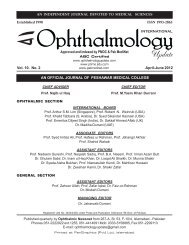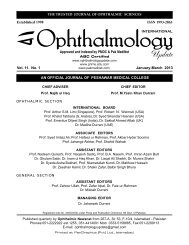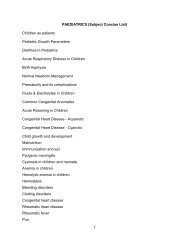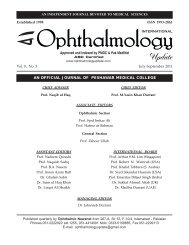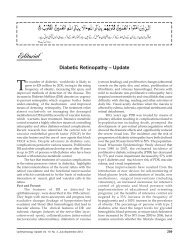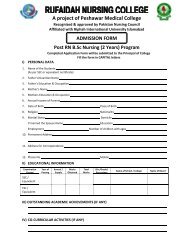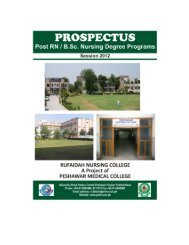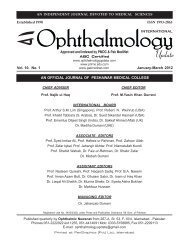- Page 2 and 3:
EMQs in CLINICAL MEDICINE
- Page 4 and 5:
EMQs in CLINICAL MEDICINE Irfan Sye
- Page 6 and 7:
Dedication To Mum, Dad, Reshma and
- Page 8 and 9:
Contents vii SECTION 4: NEUROLOGY 7
- Page 10 and 11:
Preface Extended matching questions
- Page 12 and 13:
INTRODUCTION: EMQ REVISION The most
- Page 14 and 15:
SECTION 1: CARDIOVASCULAR MEDICINE
- Page 16 and 17:
Pulses 3 2 Pulses A B C D E F mitra
- Page 18 and 19:
Jugular venous pressure 5 4 Jugular
- Page 20 and 21:
ECG abnormalities 7 6 ECG abnormali
- Page 22 and 23:
Treatment of heart failure 9 8 Trea
- Page 24 and 25:
Cardiovascular emergencies 11 10 Ca
- Page 26 and 27:
Pulses - answers 13 D A 23-year-old
- Page 28 and 29:
Jugular venous pressure - answers 1
- Page 30 and 31:
Hypertension - answers 17 activity.
- Page 32 and 33:
Treatment of arrhythmias - answers
- Page 34 and 35:
Cardiovascular emergencies - answer
- Page 36 and 37:
Cardiovascular medicine - revision
- Page 38 and 39:
Cardiovascular medicine - revision
- Page 40 and 41:
SECTION 2: RESPIRATORY MEDICINE 11
- Page 42 and 43:
Causes of pneumonia 29 12 Causes of
- Page 44 and 45:
Chest radiograph pathology 31 14 Ch
- Page 46 and 47:
Treatment of asthma and COPD 33 16
- Page 48 and 49:
Management of COPD 35 18 Management
- Page 50 and 51:
Shortness of breath - answers 37 AN
- Page 52 and 53:
Haemoptysis - answers 39 and Mycopl
- Page 54 and 55:
Chest radiograph pathology - answer
- Page 56 and 57:
Treatment of asthma and COPD - answ
- Page 58 and 59:
Emergency management: respiratory d
- Page 60 and 61:
Treatment of respiratory infections
- Page 62 and 63:
Respiratory medicine - revision box
- Page 64 and 65:
SECTION 3: HAEMATOLOGY AND ONCOLOGY
- Page 66 and 67:
Anaemia 53 21 Anaemia A B C D E F s
- Page 68 and 69:
Haematological diseases 55 23 Haema
- Page 70 and 71:
Tumour markers 57 25 Tumour markers
- Page 72 and 73:
Adverse effects of chemotherapy 59
- Page 74 and 75:
Anaemia - answers 61 It is importan
- Page 76 and 77:
The peripheral blood film - answers
- Page 78 and 79:
Cancer care - answers 65 In Ham’s
- Page 80 and 81:
Adverse effects of chemotherapy - a
- Page 82 and 83:
Haematology and oncology - revision
- Page 84 and 85:
Haematology and oncology - revision
- Page 86 and 87:
SECTION 4: NEUROLOGY 28 Dizziness a
- Page 88 and 89:
Headache 75 29 Headache A B C D E F
- Page 90 and 91:
Weakness in the legs 77 31 Weakness
- Page 92 and 93:
Cranial nerve lesions 79 33 Cranial
- Page 94 and 95:
Neurological problems 81 35 Neurolo
- Page 96 and 97:
Falls and loss of consciousness 83
- Page 98 and 99:
Antiepileptic drug therapy 85 39 An
- Page 100 and 101:
Treatment of Parkinson’s disease
- Page 102 and 103:
Headache - answers 89 B I A 50-year
- Page 104 and 105:
Headache - answers 91 The clusters
- Page 106 and 107:
Weakness in the legs - answers 93 D
- Page 108 and 109:
Abnormal movements - answers 95 33
- Page 110 and 111:
Neurological problems - answers 97
- Page 112 and 113:
Falls and loss of consciousness - a
- Page 114 and 115:
Antiepileptic drug therapy - answer
- Page 116 and 117:
Treatment of headache - answers 103
- Page 118 and 119:
Neurology - revision boxes 105 REVI
- Page 120 and 121:
Neurology - revision boxes 107 Box
- Page 122 and 123:
Neurology - revision boxes 109 Box
- Page 124 and 125:
SECTION 5: ORTHOPAEDICS AND RHEUMAT
- Page 126 and 127:
Joint pain 113 43 Joint pain A B C
- Page 128 and 129:
Back pain 115 45 Back pain A B C D
- Page 130 and 131:
Complications of fractures 117 47 C
- Page 132 and 133:
Fall on the outstretched hand 119 4
- Page 134 and 135:
Knee problems 121 51 Knee problems
- Page 136 and 137:
Disease-modifying anti-rheumatic dr
- Page 138 and 139:
Joint pain - answers 125 triggered
- Page 140 and 141:
Back pain - answers 127 males. The
- Page 142 and 143:
Rheumatological conditions - answer
- Page 144 and 145:
Fall on the outstretched hand - ans
- Page 146 and 147:
Shoulder problems - answers 133 50
- Page 148 and 149:
Disease-modifying anti-rheumatic dr
- Page 150 and 151:
Orthopaedics and rheumatology - rev
- Page 152 and 153:
Orthopaedics and rheumatology - rev
- Page 154 and 155:
SECTION 6: THE ABDOMEN AND SURGERY
- Page 156 and 157:
Abdominal pain 143 55 Abdominal pai
- Page 158 and 159:
Liver diseases 145 57 Liver disease
- Page 160 and 161:
Jaundice 147 59 Jaundice A B C D E
- Page 162 and 163:
Presentation with a lump 149 61 Pre
- Page 164 and 165:
Lumps in the groin 151 63 Lumps in
- Page 166 and 167:
Anorectal conditions 153 65 Anorect
- Page 168 and 169:
Treatment of peripheral vascular di
- Page 170 and 171:
Haematuria 157 69 Haematuria A B C
- Page 172 and 173: Dysphagia 159 71 Dysphagia A B C D
- Page 174 and 175: Haematemesis 161 73 Haematemesis A
- Page 176 and 177: Constipation 163 75 Constipation A
- Page 178 and 179: Treatment of gastrointestinal condi
- Page 180 and 181: Abdominal pain - answers 167 Helico
- Page 182 and 183: Liver diseases - answers 169 E F A
- Page 184 and 185: Causes of splenomegaly - answers 17
- Page 186 and 187: Jaundice - answers 173 C A J L M He
- Page 188 and 189: Presentation with a lump - answers
- Page 190 and 191: Lumps in the groin - answers 177 G
- Page 192 and 193: Anorectal conditions - answers 179
- Page 194 and 195: Treatment of peripheral vascular di
- Page 196 and 197: Haematuria - answers 183 G A 46-yea
- Page 198 and 199: Dysphagia - answers 185 G K A 10-ye
- Page 200 and 201: Haematemesis - answers 187 Common b
- Page 202 and 203: Constipation - answers 189 L J A 17
- Page 204 and 205: Treatment of gastrointestinal condi
- Page 206 and 207: The abdomen and surgery - revision
- Page 208 and 209: SECTION 7: METABOLIC AND ENDOCRINE
- Page 210 and 211: Nutritional deficiencies 197 79 Nut
- Page 212 and 213: Disorders of sodium balance 199 81
- Page 214 and 215: Diabetic complications 201 83 Diabe
- Page 216 and 217: Endocrine problems - answers 203 AN
- Page 218 and 219: Electrolyte and metabolic disturban
- Page 220 and 221: Hypercalcaemia - answers 207 The wa
- Page 224 and 225: Metabolic and endocrine disturbance
- Page 226 and 227: SECTION 8: MISCELLANEOUS 85 Antibio
- Page 228 and 229: Antibiotics 215 86 Antibiotics A B
- Page 230 and 231: Antiviral therapies 217 88 Antivira
- Page 232 and 233: Treatment of poisioning and overdos
- Page 234 and 235: Adverse drug reactions 221 92 Adver
- Page 236 and 237: Adverse drug reactions 223 94 Adver
- Page 238 and 239: Infections 225 96 Infections A B C
- Page 240 and 241: Medical emergencies 227 98 Medical
- Page 242 and 243: Drugs and immunity 229 100 Drugs an
- Page 244 and 245: Treatment of infection - answers 23
- Page 246 and 247: Poisoning and overdose - answers 23
- Page 248 and 249: Treatment of poisoning and overdose
- Page 250 and 251: Adverse drug reactions - answers 23
- Page 252 and 253: Adverse drug reactions - answers 23
- Page 254 and 255: Infections - answers 241 D H N A 72
- Page 256 and 257: Infections - answers 243 I G A This
- Page 258 and 259: The confused patient - answers 245
- Page 260 and 261: Drugs and immunity - answers 247 J
- Page 262 and 263: Index 249 antibiotics 85, 86 antibo
- Page 264 and 265: Index 251 compartment syndrome 47 c
- Page 266 and 267: Index 253 gastric carcinoma 26, 56,
- Page 268 and 269: Index 255 laparotomy 77 lateral med
- Page 270 and 271: Index 257 penicillamine 53, 57, 81,
- Page 272 and 273:
Index 259 spinal stenosis 45 spiron



